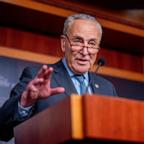Airlines See Revenue Increase From Fees
Airlines have become increasingly dependent on added fees for revenue.
— -- Zach Bennett decided not to fly on Delta Air Lines this month after learning that the fee for taking his dog, Matilda, along was more expensive than his own ticket between Denver and Salt Lake City.
Delta charges $250 round trip to transport a pet — $52 more than the ticket Bennett considered buying for himself. He flew on Southwest, which charged $150 round-trip for Matilda.
"Southwest was more reasonable, but still, $75 each way was too much for Matilda to fly under my seat," says Bennett of Fort Collins, Colo. "Some fees are understandable, but the airlines have gone too far."
Airline fees for products and services, such as checking bags, rebooking flights and taking along pets, keep inching up. Airlines have become increasingly dependent on them for revenue. And they're a continuing source of disgruntlement for many fliers who keep looking for ways to avoid them.
During the first three months this year, U.S. airlines collected a record $1.38 billion in fees to check baggage and change reservations, the Transportation Department's Bureau of Transportation Statistics reported on Sept. 13.
That's $59 million more than they collected in the first quarter of last year, and $1.1 billion more than the first three months of 2007, when extra fees first began to appear.
"Ten years ago, airlines just raised fares," says Michael Boyd, an aviation consultant in Evergreen, Colo. "Today, ancillary revenues are a key part of the revenue stream and have resulted in fares not increasing as much."
The emergence of fees reflect a change in how airlines market and price themselves — and cover their costs. By unbundling the price of flying from a lump-sum ticket, airlines force travelers to choose the products and services they want to buy. They're also allocating part of the costs of getting people from one place to another based on the services passengers choose.
"Bag fees are an example of product unbundling that allows carriers to better align the total price a passenger pays with the cost of providing that service," says Darin Lee, an airline expert for Compass Lexecon, an economic consulting company. "Passengers who check bags impose additional costs on the airline, and bag fees are a means to pass that cost along to the passenger."
U.S. airlines lost more than $65 billion in the last decade and learned that airfares cannot cover their costs, says Steve Lott, a spokesman for the Air Transport Association of America, which represents U.S. airlines.
"Airlines have restructured to resume a path toward sustained profitability," he says. "Without sustained profitability, airlines cannot add routes, add workers or buy new airplanes."
Differing perspectives
To many consumers, though, the growing number of fees and their escalating prices have gone beyond covering costs.
"Fees are out of control and reflect badly on the airlines charging them," says frequent business traveler Scott Morris of Austin. "The fees have started looking more like gouging — opportunistic ways to collect money from a captive customer."
Lott, however, says "the marketplace and consumers are the ultimate judge" whether some fees are too expensive.
Airlines should simplify and eliminate fees, Morris says, and add them to ticket prices.




